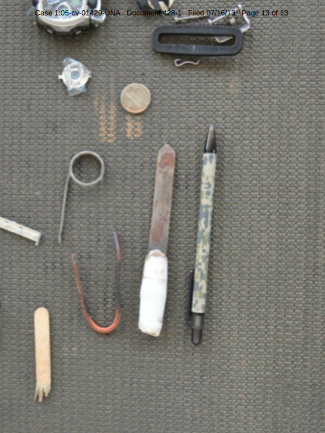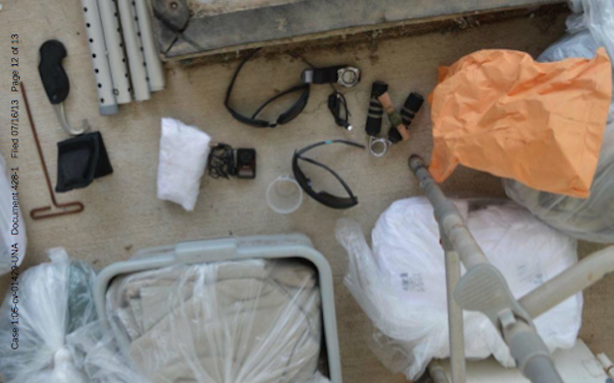Who Is Giving the Guantanamo Detainees Contraband?
The U.S. military is fighting in court for the right to search Guantanamo detainees' genitals before and after they meet with their lawyers. The military says it needs the genital searches—which a federal judge halted last week, an order the Justice Department asked the judge to put on hold late Tuesday night — because it's says detainees will smuggle contraband in their crotches. That stuff can be used to injure guards or other detainees, or commit suicide, the government says. Where do the detainees get it? As Marine Corps Gen. John F. Kelly wrote in an affidavit, "Outside visitors appear to be one of the likely sources of the contraband that JTF-GTMO has discovered, particularly items not normally found in the camps such as electronic devices, food items, and non-issue clothing." But if you look at the contraband, it suggests some of it comes from inside sources—maybe the American guards?
RELATED: Life in Guantanamo Continues to Improve as Genital Searches Are Halted
Kelly included two photos (above and at right) of contraband confiscated in June. Some of them do look like crude weapons, like an old nail file. Others look like garbage, such as a broken popsicle stick. But some are more curious. At The Public Record, Jason Leopold writes:
At least one item, a pair of Oakley sunglasses, is “standard Army issue,” according to former Guantanamo guard Joseph Hickman, leading him to believe that guards are providing the prisoners with some contraband, planting the material in their cells or are just being sloppy and the prisoners are “paying the price by being punished.”
Another item looks like a hook that air assault-qualified military members use when rappelling off cliffs and helicopters. Hickman asks, "how would all of that end up in a detainee’s cell?" Another item is a pen covered with the military's digitized camo pattern, which is the kind of thing you can buy, though not exclusively, in military shops. Another item looks like one of those hand exercisers used to strengthen your forearms.
RELATED: U.S. Troops, Kosovo, and Ducks
That, and Kelly's mention of "non-issue clothing," calls to mind another incident when detainees were caught with contraband. In 2007, Gitmo officials accused lawyer Clive Stafford-Smith of smuggling underwear to his client, detainee Shaker Aamer. "Your client Shaker AAmer, detainee ISN 239, was recently discovered to be wearing UnderArmor briefs and a Speedo bathing suit. Neither item was issued to the detainee by JTF-Guantanamo personnel, nor did they enter the camp through regular mail," the staff judge advocate said. "[W]e would like to know whether the contraband material, or any portion thereof, was provided by you, anyone else on your legal team..."
RELATED: Happy Hour Vid: Ann Coulter Demands a Heterosexual New York Times
But Stafford-Smith smuggling it would be impossible for reasons that would apply today. "As you know, anything we take in is searched and there is a camera in the room when we visit the client. Does someone seriously suggest that Mr. Katznelson or I have been stripping off to deliver underpants to our clients?" And Stafford-Smith had never heard of Under Armour. But you know who had? The troops. He noted "this line of underpants are very popular among the military." The underwear was sold in military shops around the world, as an Under Armour executive had bragged to the Army Times. Perhaps a guard had given Aamer, and two other Under Armour-clad detainees, the underwear, he suggested.
RELATED: How General Petraeus Will Change Afghan War Strategy
This is not to say that some detainees aren't dangerous. Clearly some detainees have an antagonistic relationship with the guards. Kelly writes that "Detainees routinely taunt guards with racial epithets and sexually-offensive comments, 'splash' them with feces, urine, and other bodily fluids, and physically assault them when they can." But, given the sunglasses and underwear contraband, maybe in some cases, the relationship between guards and detainees is more complex.


